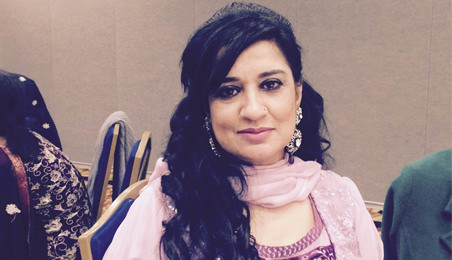Noshaba’s Journey from Blurred Vision to Successful Tumor Removal at Mount Sinai
In November of 2014, Noshaba Javed was diagnosed with a large skull base meningioma- tumor around the nerve that transmits visual information from the eye to the brain, called the optic nerve. This was only discovered after she started to have unbearably painful headaches and blurred vision in her left eye months prior. “Having met numerous specialists, I began to worry that perhaps no one knew what was wrong with me,” she recalls. “The ophthalmologist told me my eyes look perfect but couldn’t explain the blurred vision. I lived in fear, afraid of the unknown.”
 After conducting an MRI, her neurologist, Dr. Jacoby, suspected a tumor had developed in her brain. “He then referred me to Dr. Raj Shrivastava for further treatment at The Skull Base Surgery Center at Mount Sinai. Sure enough, it was he who discovered the tumor in my brain. Upon hearing about the tumor, I had so many questions. My entire life flashed through my eyes. I didn’t know where to begin. But Dr. Shrivastava talked me through the procedure and answered all questions that came up. After meeting him twice, I felt better about going forth with the surgery.” Miraculously, Dr. Shrivastava was able to remove the tumor without damaging any part of my brain.”
After conducting an MRI, her neurologist, Dr. Jacoby, suspected a tumor had developed in her brain. “He then referred me to Dr. Raj Shrivastava for further treatment at The Skull Base Surgery Center at Mount Sinai. Sure enough, it was he who discovered the tumor in my brain. Upon hearing about the tumor, I had so many questions. My entire life flashed through my eyes. I didn’t know where to begin. But Dr. Shrivastava talked me through the procedure and answered all questions that came up. After meeting him twice, I felt better about going forth with the surgery.” Miraculously, Dr. Shrivastava was able to remove the tumor without damaging any part of my brain.”
Innovative Neurosurgery and Head and Neck Surgery Team
“Alongside Dr. Shrivastava was head and neck surgeon Dr. Alfred Iloreta, a brilliant surgeon with knowledge beyond his years. These two surgeons have exceptional experience and knowledge. In addition, they are innovative and forward thinking. I find that to be an essential characteristic of an excellent surgeon.”
Drs. Shrivastava and Iloreta used a minimally invasive, endoscopic technique to remove the intracranial tumor. The team employed the Surgical Theater navigation system to assist in the tumor resection and approach, marking the first time ever this FDA-approved technology was used in the OR by a neurosurgeon and head and neck surgeon working side-by-side. “In conjunction with the neuro-navigation, the 3D modeling of Surgical Theater gave us an additional dimension to precisely plan our approach angles to the tumor,” Dr. Iloreta noted. “It allowed us to quickly and efficiently gain access to Noshaba’s tumor and also anticipate critical neurovascular structures.”
In addition to the Surgical Theater navigation system, the team employed a new protocol for Ultra-High field 7T MRI imaging in order to better study and delineate the tumors. Mount Sinai is the only hospital nationwide to be performing the application of this technology in skull base surgery.
“The two doctors also convinced me to try a new form of nasal dressing after the surgery,” Noshaba added. “Instead of placing type of packing that had to be removed, Dr. Iloreta used a dissolvable type. I was relieved to have been given this option because I cannot imagine how uncomfortable the hard type might have been.” Her recovery was quick and she did not have any incisions on her face or scalp.
Now Noshaba is back living her life, and grateful for her care. “I thank God for my successful surgery, to have been in the capable hands of skilled surgeons, and to have received great post-op care at Mount Sinai.”